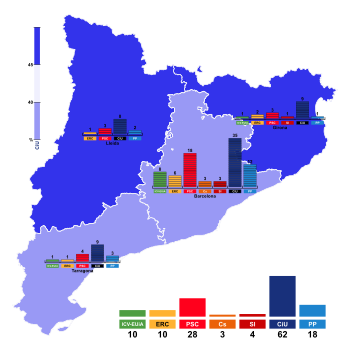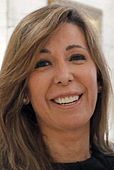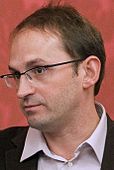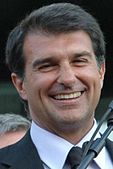
Back Eleccions al Parlament de Catalunya de 2010 Catalan Parlamentswahl in Katalonien 2010 German Elecciones al Parlamento de Cataluña de 2010 Spanish 2010eko Kataluniako Parlamentuko hauteskundeak Basque Élections au Parlement de Catalogne de 2010 French Eleccións ao Parlamento de Cataluña de 2010 Galician Elezioni parlamentari in Catalogna del 2010 Italian Wybory parlamentarne w Katalonii w 2010 roku Polish Eleições regionais na Catalunha em 2010 Portuguese
| |||||||||||||||||||||||||||||||||||||||||||||||||||||||||||||||||||||||||||||||||||||||||||||||||||||||||||||||||||||||||||||||||||||||||||||
All 135 seats in the Parliament of Catalonia 68 seats needed for a majority | |||||||||||||||||||||||||||||||||||||||||||||||||||||||||||||||||||||||||||||||||||||||||||||||||||||||||||||||||||||||||||||||||||||||||||||
|---|---|---|---|---|---|---|---|---|---|---|---|---|---|---|---|---|---|---|---|---|---|---|---|---|---|---|---|---|---|---|---|---|---|---|---|---|---|---|---|---|---|---|---|---|---|---|---|---|---|---|---|---|---|---|---|---|---|---|---|---|---|---|---|---|---|---|---|---|---|---|---|---|---|---|---|---|---|---|---|---|---|---|---|---|---|---|---|---|---|---|---|---|---|---|---|---|---|---|---|---|---|---|---|---|---|---|---|---|---|---|---|---|---|---|---|---|---|---|---|---|---|---|---|---|---|---|---|---|---|---|---|---|---|---|---|---|---|---|---|---|---|
| Opinion polls | |||||||||||||||||||||||||||||||||||||||||||||||||||||||||||||||||||||||||||||||||||||||||||||||||||||||||||||||||||||||||||||||||||||||||||||
| Registered | 5,363,688 | ||||||||||||||||||||||||||||||||||||||||||||||||||||||||||||||||||||||||||||||||||||||||||||||||||||||||||||||||||||||||||||||||||||||||||||
| Turnout | 3,152,630 (58.8%) | ||||||||||||||||||||||||||||||||||||||||||||||||||||||||||||||||||||||||||||||||||||||||||||||||||||||||||||||||||||||||||||||||||||||||||||
| |||||||||||||||||||||||||||||||||||||||||||||||||||||||||||||||||||||||||||||||||||||||||||||||||||||||||||||||||||||||||||||||||||||||||||||
 Election result by constituency | |||||||||||||||||||||||||||||||||||||||||||||||||||||||||||||||||||||||||||||||||||||||||||||||||||||||||||||||||||||||||||||||||||||||||||||
| |||||||||||||||||||||||||||||||||||||||||||||||||||||||||||||||||||||||||||||||||||||||||||||||||||||||||||||||||||||||||||||||||||||||||||||
The 2010 Catalan regional election was held on Sunday, 28 November 2010, to elect the 9th Parliament of the autonomous community of Catalonia. All 135 seats in the Parliament were up for election. This was the first election held in Catalonia after the Constitutional Court of Spain struck down parts of the regional 2006 Statute of Autonomy that granted new powers of self-rule to the region. The ruling came after four years of deliberation concerning a constitutional appeal filed by the conservative People's Party (PP) under Mariano Rajoy and was met with anger and street protests throughout the region.[1][2]
The election resulted in a resounding victory for the Convergence and Union (CiU) federation under Artur Mas, whose 62 seats—six short of an absolute majority—virtually ensured that no alternative government was mathematically possible, as the left-wing alliance which had formed the government of Catalonia for the previous seven years fell to a bare 48 seats. The tripartit (English: tripartite) coalition formed by the Socialists' Party of Catalonia (PSC), Republican Left of Catalonia (ERC) and Initiative for Catalonia Greens (ICV) was already at the brink of split going into the election, with political disagreements between the former allies having led Catalan president José Montilla to announce that he would not seek a third alliance with ERC and ICV even if election numbers favored such a possibility.[3] The election saw a collapse in support for all three parties and Montilla's retirement from the PSC leadership shortly afterwards.[4]
The PP had one of its best showings in a Catalan regional election, with 12.4% of the vote and 18 seats. Albert Rivera's Citizens (C's) party saw a slight increase in its vote share, whereas the pro-Catalan independence Catalan Solidarity for Independence (SI) led by former FC Barcelona president Joan Laporta secured 4 seats in the Parliament.
- ^ "Spanish Constitutional Court cuts back Catalan Statute of Autonomy". Nationalia. 29 June 2010. Retrieved 21 September 2017.
- ^ Govan, Fiona (29 June 2010). "Catalonia can call itself a 'nation', rules Spain's top court". The Daily Telegraph. Madrid. Retrieved 21 September 2017.
- ^ Piñol, Àngels; Cia, Blanca (25 October 2010). "Montilla entierra el tripartito y descarta repetirlo aunque sume". El País (in Spanish). Barcelona. Retrieved 7 January 2018.
- ^ "Montilla dejará la secretaría general del PSC". Libertad Digital (in Spanish). 28 November 2010. Retrieved 7 January 2018.
© MMXXIII Rich X Search. We shall prevail. All rights reserved. Rich X Search






